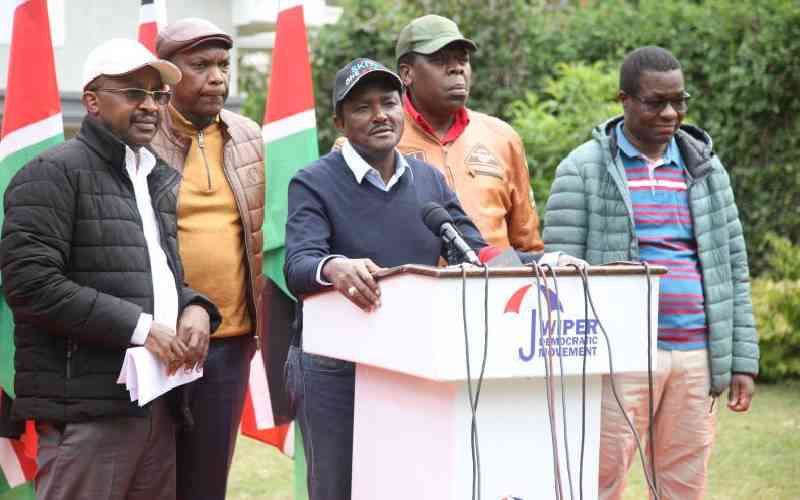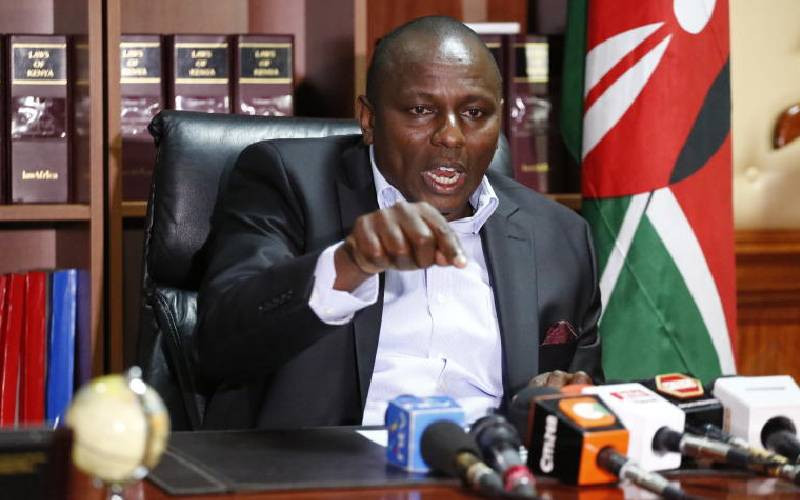
Usawa Kwa Wote Party leader Mwangi Wa Iria, former Ndaragwa MP Jeremiah Kioni, Wiper leader Kalonzo Musyoka, former Defence CS Eugene Wamalwa and National Assembly Minority Leader Opiyo Wandayi in Nairobi on July 22, 2023. [File, Standard]
A showdown looms ahead of Monday when bipartisan teams from Kenya Kwanza and Azimio La Umoja meet for a fresh round of talks aimed at resolving differences between the government and the opposition.
The opposition coalition Azimio La Umoja led by ODM leader Raila Odinga has been at crossroads with Ruto's government, especially over the high cost of living which saw the opposition stage protests to push for lowering of the cost of basic commodities.
Raila has also been at odds with President Ruto over alleged fraud in last year's General Election after the former prime minister claimed his victory was stolen.
Ruto has said he is keen on restoring Kenya's fiscal discipline after public debt surged massively under his predecessor, President Uhuru Kenyatta. However, Ruto’s decision to increase taxes on a wide range swathe of economic activities as part of the Finance Act 2023 has faced pushback from civil servants and political opponents, including Odinga.
Both camps are yet to agree on contentious issues such as the matters for debate even as the opposition insists that the talks should be bound by the framework agreement used in the recently flopped talks.
Friday’s spat on the meeting venue and time for the first meeting has further signalled that the talks may drag out beyond the 30-day window period. This is after Wiper party leader Kalonzo Musyoka, through a statement, invited the Kenya Kwanza team for talks at Serena Hotel in Nairobi on Monday, August 7 at 11 am. However, National Assembly Majority Leader Kimani Ichung’wa said the co-chairs would sit and agree on the meeting venue and time.
"As agreed, we will consult over a cup of tea to find a mutually agreeable date, time and venue," tweeted Ichungwa.
And as they meet, the first order of business will be to decide on the co-chairs of the bi-partisan team with Kalonzo and Ichung’wa expected to take up the said positions by virtue of being delegation leaders.
The team will also craft a secretariat and agree on the framework of engagement for the talks, paving way for the deliberations to commence.
Divergent views on the issues to be discussed however threaten to stall the talks even before they begin.

National Assembly Majority Leader Kimani Ichung'wa at his office at Parliament in Nairobi on June 2, 2023. [Elvis Ogina, Standard]
The ruling Kenya Kwanza is insistent on the talks centering on the reconstitution of the IEBC, implementation of two-thirds gender rule, the entrenchment of constituency development fund, establishment and entrenchment of the office of the leader of the opposition and the embedment of the office of Prime Cabinet Secretary.
On the flip side, Azimio has reiterated that the cost of living, an audit of the 2022 Presidential Election results, restructuring and reconstitution of IEBC and related matters, measures to prevent Interference in political parties as well as other outstanding constitutional matters will be their priority.
Both parties seem to have agreed on a majority of issues, except on the high cost of living, and an audit of the 2022 Presidential Election results that are sticking out.
The Azimio faction also holds that the talks should stick to their 30-day deadline
“We further reiterate that the issues for discussion from our side remain as indicated…we have taken this step because we believe time is of the essence. While a lot of hard work will be needed to resolve the issues at hand, we believe a speedy start and a time-bound programme is necessary to put the nation at ease. Consequently, we believe this process should come to an end at the close of August 2023,” reads Azimio’s statement.
However, there is fear among President William Ruto’s allies who are concerned that the talks might be used to invite the opposition into government.
Ichung’wa has consequently moved to allay the fears, emphasizing there shall be no discussion on formation of a coalition government or handshake between President Ruto and Raila.
"For the avoidance of doubt, as agreed, violence shall no longer and shall never be part of our nation's political discourse... there shall be no discussion of whatever nature on matters handshake or nusu mkate," said Ichung’wa in a statement earlier this week.
Another hurdle is whether the teams will agree on a framework of an agreement with Azimio stating it wishes to rely on the already signed framework document on bipartisan talks. According to the agreement, the bipartisan committee shall stand dissolved upon presentation of the final report by mutual consent of the parties. The committee may adjourn the talks to build consensus on any issue.
In the event of irreconcilable differences on a core issue, the talks may be suspended for seven days by written notice by either of the co-chairpersons provided that the talks may resume before the expiry of the seven days if the parties reach a consensus.
“If the parties cannot agree within seven days of suspension of the talks, either party may give notification of dissolution of the talks,” states the agreement.
It also gives the committee a 60-day window for the conclusion of the talks provided that the committee shall determine the urgent matters within 30 days and the committee may at any time agree on interim measures necessary for the resolution of the Issues
“If there are outstanding issues after sixty days, the committee may, in consultation with the appointing authority, extend the timeframe as appropriate,” it adds.
National Assembly speaker Moses Wetang’ula has waded into the impending talks, urging both parties to adopt a “patriotic attitude” to ensure the country remains united.
“The cost of living will be reduced by production not by shouting at each other. In my long life in politics, I have been in the opposition, I have been in government, and I know the expectations from both,” said Wetang’ula.
He added: “When you are in the opposition, your duty is to correct and not disrupt. When you are in government, your duty is not to gloat, or exalt yourself but offer constructive use of public resources that have been put at your disposal.”